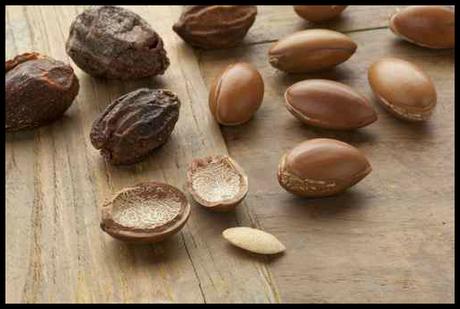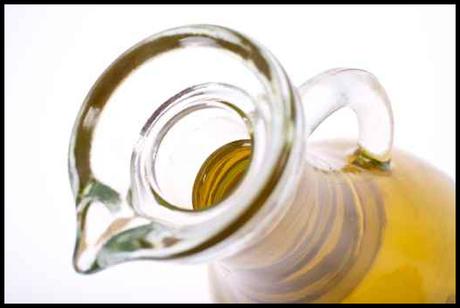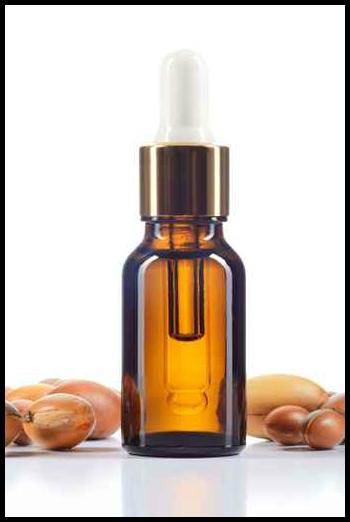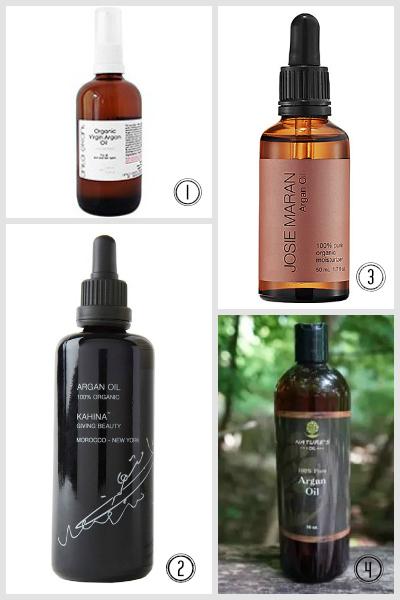Argan Oil seems to be in everything these days, but it’s actually been around for thousands of years and used by the Berber people of Morocco (thus the name Moroccan Oil). Since the late 1990’s it has taken the beauty biz by storm being included in everything from hair and skin treatments to candles and cooking oil. But not all argan oil is the same.
Argan oil is a plant oil produced from the kernels of the argan tree (Argania spinosa L.), which grows in the semi-desert area of south western Morocco. The kernels are then removed, crushed and then ground into a thick paste. The paste is then squeezed to produce the oil. Chemically speaking, argan oil consists of a blend of fatty acids (over 70% oleic and linoleic acids.) It is also rich in vitamin E, phenols, carotenes and tocopherols .

Argan Oil Nutrition
Believe it or not, there are two types of argan oil: one used for cooking and one for cosmetics. Edible argan oil smells like toast and has a nutty flavor. Because argan oil is extremely high in antioxidants, it’s excellent at fighting free radicals and inflammation in the body. It also has been known to help reduce the proliferation of malignant cancer cells. You can consume up to 1-2 tablespoons of argan oil each day in order to take advantage of its therapeutic or preventative properties. You shouldn’t cook with this oil, as heating it can reduce some of its benefits. Instead, add the oil to cooked foods or consume it as part of a salad dressing.
Note: MOST ARGAN OIL FOUND AT BEAUTY SUPPLY STORES IS NOT THE EDIBLE KIND. PLEASE SEE THE LINKS AT THE BOTTOM FOR LINKS TO EDIBLE ARGAN OIL. ALSO CONSULT WITH YOUR DOCTOR IF YOU HAVE ANY NUT OR SEED ALLERGIES BEFORE INGESTING ARGAN OIL.

Argan Oil in Beauty Products
Even though argan oil is often mixed into beauty products, because of the high antioxidant content, argan oil is excellent for hair and skin all on its own.
Skin
Vitamin E is found in very high quantities in argan oil, and because it has a light consistency it won’t clog pores. This makes it a great alternative for Oil Cleansing and makeup removal. Even though it’s an oil, the oleic acid properties it contains helps balance skin’s sebum and prevent the swelling and scarring caused by acne (unlike the usual treatments for acne like benzoyl peroxide and alcohol, which are extremely drying).
It’s also helpful for people who suffer from eczema or rosacea. Pregnant women who use argan oil on their bellies and thighs can reduce and prevent the appearance of stretch marks. The Vitamin A and E keep the skin soft and supple, thus preventing the striations that occur when skin stretches.
Hair and Scalp Benefits
Those same moisturizing properties are what make argan oil excellent to use on the scalp as well. Scalp shedding and dandruff occur when the skin on the scalp can’t breathe. Argan oil is light enough to moisturize and stimulate healthy skin growth without clogging scalp pores. It can also promote the growth of healthy, strong hair as opposed to thin, brittle hair.
Argan oil is non-irritating and has been known to reverse much of the damage done by artificial chemicals and treatments on hair. The oil is considered a “mild penetrating oil” and has the ability to penetrate the hair’s cuticle. (To learn more about penetrating oils and other science stuff click here).
As I have mentioned before, Oil alone CANNOT moisturize your hair. Water does that. But Argan oil is a wonderful penetrating way to seal in that moisture by preventing moisture loss and adding elasticity to the hair.
Ways to Use Argan Oil
- Beauty serum – I use 2 drops of argan oil plus 2 drops of rosehip seed oil and rub it into my face right after I wash it. Sometimes I even skip my moisturizer my skin feels so supple. (It’s been great at reducing fine lines and wrinkles too!
- Scalp massage oil – I have also taken argan oil, and along with a drop or two of tea tree essential oil massaged my scalp. This has resulted in faster hair growth and a great feeling scalp!
- Deep Conditioner – I have also added it to my AOHSR deep conditioning mix (especially after I henna and my hair is really dry) and had great results
- Lip scrub – A drop of argan oil plus a pinch of sugar and you have one of the cheapest, most effective lip scrubs out there
- Reduce split ends – When I’m doing twists or bantu knots, a little argan oil on my ends keeps them from tangling up and splitting

How to Buy
The demand for Argan oil in the 1990’s led to the mechanisation of Argan oil production.
European and Chinese Entrepreneurs jumped on the opportunity to generate huge profits by exporting Argan oil to the West. But demand outran supply and in order to keep up and lower the cost of Argan oil production, companies invested in mechanical presses and equipment for extraction using solvents. (Instead of extracting the oil by hand like many cooperatives still do in Morocco).
Some Moroccan hair care lines use silicones as their primary ingredients to make their products thinner. Others dilute theirs with carrier oils such as olive oil and sunflower oil. If you are looking to use a product that promotes argan oil as the primary ingredient, be sure to look at the label and make sure that it is one of the first three ingredients listed.
Real argan oil will have a nutty smell. It will NOT smell flowery like perfume. Argan oil should always be in a dark brown or blue glass bottle. Never buy the oil if it is in plastic or a clear container. Also, the real stuff isn’t cheap. I’m not saying that you have to pay $60 an ounce for the stuff. I’m just saying that real Argan oil can’t be sold for $5 a bottle because that means there is either little to no argan oil in that bottle or the people who harvested it are not getting paid. Below are the places I would trust to buy it from.

Companies I Recommend
- Anita Grant – This is my #1 choice. Not only is her company dedicated to natural, healthy organic and fairtrade products; she can provide PROOF as to the authenticity of her oils. She’s London based, so all you international Savvy readers can purchase her stuff easily!
- Kahina Giving Beauty – This company is actually named for a Berber Queen and consistently gives back to the communities that it works with in Morocco. They also use environmentally friendly packaging and ethically sourced materials
- Josie Maran – She built her whole company on argan oil and has a true commitment to her product, it’s quality, and to the people who she sources it from.
- Bulk Apothecary – Cooking Argan Oil
• Do you use Argan Oil? How do you use it? Let me know in the comments!

